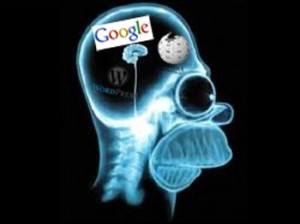Review of The Google Effect (full PDF here)
Tara Brabazon contends that due to the nature of Google, blogs, and wikis, we are coming to value popularity more than quality, and as a result, we are seeing a flattening of expertise, which she coins The Google Effect. Because Google’s top results are generated by a complex algorithm which in layman’s terms can be boiled down to “more traffic and clicks = higher search results†we’re seeing the popular items atop the heap, leaving the higher quality (but less popular) items to fall down the search results to the 2nd, 3rd, or 798th page.
Brabazon makes some valid cautionary points regarding Google, blogs, and wikis. The vast majority of us never look past the first page of Google results for many queries, never delving in with much depth in to a topic. Nicholas Carr deemed this outcome of our internet-addicted lives The Shallows, a (Pulitzer finalist) book about the effect the internet is having on our brains. The book was developed from Carr’s essay Is Google Making Us Stupid? in which he presented a thesis which is somewhat similar to Brabazon’s. He wonders if we are becoming ‘pancake people’ – with a wide but flat knowledge base – knowledgeable in many areas, but experts in none. Carr differs from Brabazon in that he presents his thoughts as objective musings rather than subjective criticisms.
Brabazon confirms her elitist frame of mind early, firmly stating that “As blogs continue to fill the Web with the bizarre daily rituals and opinions of people we would never bother speaking to at a party, let alone invite into our homes, there has never been a greater need to stress the importance of intelligence, education, credentials and credibility.†Perhaps that is a benefit of the internet – that we are exposed to more opinions and viewpoints than we would allow ourselves to in the analog world? Thomas L. Friedman would say so, as he expressed in The World Is Flat – his ode to globalization and the levelling of the playing field brought upon by the internet.
And what about the supposed wisdom of crowds? Aren’t we told that as a crowd, our collective intelligence is increased? Jeff Howe’s Crowdsourcing, Clay Shirky’s Cognitive Surplus and Don Tapscott’s and Anthony D. Williams’ Macrowikinomics are three (popular – oh no!) books which have illustrated the power and capabilities of our networked communities, using a wide range of examples including the open source community (Linux, Firefox, WordPress, etc), networks of amateur astronomers aiding professionals (GalaxyZoo.org), the use of social media to save lives in Haiti and Japan during devastating earthquakes, and the amazing capabilities of microlending website Kiva.org, which has facilitated nearly 300,000 loans totalling more than $200 million dollars, primarily assisting small businesses in third-world countries.
I’ve spoken to academia at this university about these particular books, and had the authors’ arguments dismissed because they “wrote for a popular audience, rather than one that is scholarly.†I think this type of thinking is inherently flawed. To me it looks something like this:
Popular stuff is not peer reviewed
If something is not peer reviewed, it is low quality
Everything popular is of low quality
Perhaps I’m going out on a limb here, but I think that Brabazon’s line of thinking is only too common in the mindset of those who have developed their understanding in the academic environment of the industrial age. It’s extremely linear, top-down, and close-minded.
[Will we ever have another Copernicus or Einstein? Could an amateur astronomer or an obscure patent clerk, working in isolation, wow the world with a startling new theory? Or are we so caught up in the extensive peer review process of circular back-patting that our academics would not give these amateurs the time of day?]
Misinformation and the overvaluation of popularity versus quality is not exclusive to Google. One could argue that all media throughout history has suffered from this effect to some degree.
John Dewey cites Julian Huxley’s book Scientific Research and Social Needs in saying that “one aim of education should be to teach people to discount the unconscious prejudices that their social environments impress upon them.†This was written shortly after World War II in the wake of the Hitlerization of Germany through the propaganda of the press and radio which Dewey calls “two of the most powerful means of inculcating mass prejudice.â€
Dewey contends that “An intelligent understanding of social forces given by schools is our chief protection.†It was true in the era of print and radio, and it’s still true in the era of the internet.
I’ve heard teachers say, “We can’t just let them use Wikipedia – anyone can edit it!†which first makes me laugh, and then subsequently sad. It’s been well-documented that Wikipedia is just as accurate as Britannica, and has the benefit of being instantly editable when there is an error. Wikipedia is perhaps the most incredible and comprehensive collection of human knowledge ever assembled, comparable to Borges’ mystical Library of Babel, as James Gleick illustrates in The Information.
If the tool is there, we shouldn’t hide it from our students. New tools offer opportunities, and it’s up to educators to design meaningful activities which allow us to utilize the capabilities of our digital age, while educating our students on the process of how these tools work and what their limitations are. I agree with Brabazon in her belief that digital tools such as Google and Wikipedia should represent “the start of learning, not the end.†It’s up to us educators to acknowledge this, adapt to the 21st century, and not fear the massive changes we’re experiencing in the ways we consume media.
